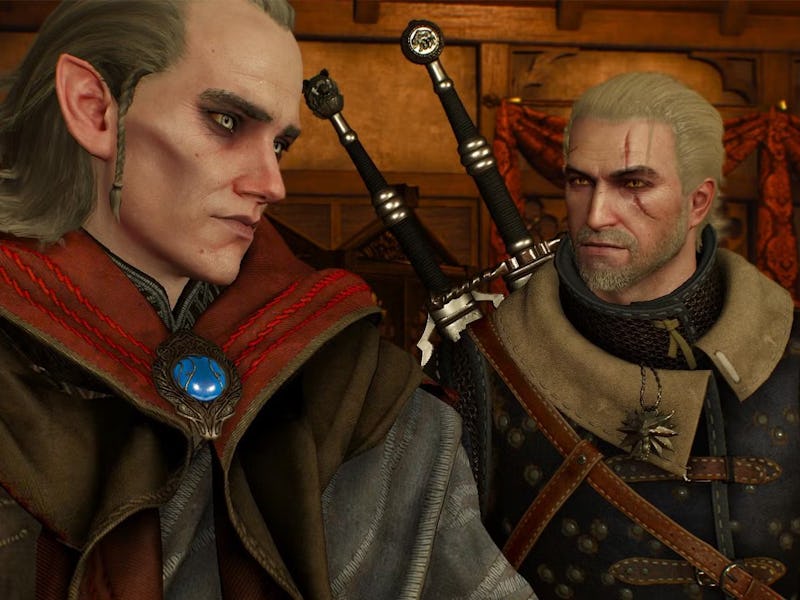The Witcher 3 Almost Had The Most Futuristic Crossover
Geralt Of Rivia in Night City? Yes please.

The Witcher 3, CD Projekt Red’s epic role-playing game, almost had one of the coolest crossovers of the decade with the developer’s other mega successful franchise. The futuristic easter egg is one of many pieces of cut content from the 2015 game, according to a group of modders documenting the legendary game’s development.
The Witcher 3 modders Crygreg, Ferroxius, Glassfish, and MoonKnight have released the first edition of their lengthy eBook series called What Lies Unseen. The text of Volume One outlines how things changed over the course of the fantasy game’s four-year development, as well as insight into what was left on the cutting room floor before its release. Among the team’s findings was a plan to bring Geralt of Rivia to the hedonistic sprawl of Night City.
In The Witcher 3, an ambitious quest called “Through Time and Space” has Geralt and his companion Avallac’h jump into a variety of worlds across realities in hopes of finding the origin of The Wild Hunt. The game sees the duo visit a variety of wildly interesting, one-off locations in the multiverse (way before it was cool).
In the verison of “Through Time and Space” that shipped with the final game, Geralt and Avallac’h jump to strange realities including a desolate desert world.
An early version of this quest however had Geralt and Avallac’h arrive in Night City through the dimension-hopping portal. Arrival would be accompanied by an exchange between the two characters about the strange location.
“What... What is this place?” Geralt would have asked Avallac’h according to the datamine. “Is this the afterlife?”
“No. Just another of the realities the Spiral leads through,” Avallac'h responds. “Technologically advanced, but broken. Dying.”
“Disgusting. This stench, noise,” Geralt says repulsed. “How can you live here?!”
“You should know better,” Avallac'h says. “This world is inhabited by humans, not elves.”
An early version of one late game quest would have landed Geralt in the urban spawl of Night City for a brief easter egg moment.
Before leaving Night City to get back on track, players would have had the ability to give a junkie (who Geralt would have mistaken for a beggar) some coin. According to the book, there would have been a payoff to this minor action some five years later. The plan was for the junkie to be someone players would encounter as V in Cyberpunk 2077.
At the time, this would have been a fun tease for fans eagerly anticipating CD Project Red’s next game. Announced in 2012, Cyberpunk 2077 was already pegged as an ambitious adaptation of the tabletop game set 50 years into our future. This version of Night City would have been based on very early concepts.
“It is unknown what part of Night City Geralt and Avallac’h find themselves in, nor the year,” the book states. “It is also unlikely to bear much resemblance to how Night City is depicted in Cyberpunk 2077 due to the early development state.”
The Cyberpunk crossover was one of several interesting tidbits to come out of What Lies Unseen. For example, the game’s original subtitle was the very Game Of Thrones-inspired “A Time of Sword and Axe,” instead of The Wild Hunt. At one point, the game’s combat also features an ability to slow down time and attack specific weak points of enemies. The way its described sounds like a twist on Fallout’s VATS system or Metal Gear Revengeance’s Blade mode.
In a relief for all the Gwent players out there, an early version of the game didn’t feature the card battler at all. Minigames would have simple had dice poker and arm wrestling from the first two games, as well as the addition of axe throwing and a card-based drinking game. The drinking game is what eventually morphed into Gwent.
While modders are uncovering fascinating history about one of the greatest RPGs ever made, CD Projekt Red is hard at work on the next chapter of the series. In November, game director Sebastian Kalemba announced that Project Polaris, which is presumed to be The Witcher 4, has entered full-scale production. For fans of the more futuristic RPG in the developer’s catalog, it announced it’s doing a Cyberpunk 2077 livestream on Twitch and YouTube this week revealing some new features for the game.